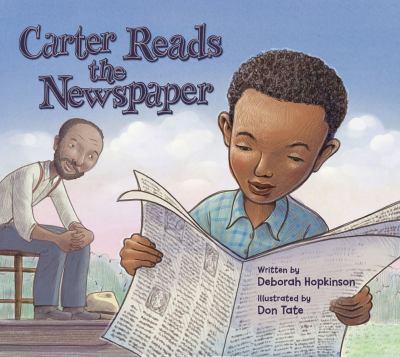
Carter reads the newspaper
Carter G. Woodson was born ten years after the end of the Civil War, to parents who had both been enslaved. Their stories were not the ones written about in history books, but Carter learned them and kept them in his heart. Carter's father could not read or write, but he believed in being an informed citizen. So Carter read the newspaper to him every day, and from this practice, he learned about the world and how to find out what he didn't know. Many years later, when he was a student at Harvard University (the second African-American and the only child of enslaved parents to do so), one of his professors said that black people had no history. Carter knew that wasn't true--and he set out to make sure the rest of us knew as well
Available Copies by Location
| Location | |
|---|---|
| Community Centre | Available |
Browse Related Items
- ISBN: 9781561459346
- Physical Description 1 volume (unpaged) : color illustrations ; 26 x 29 cm
- Publisher [Place of publication not identified] : [publisher not identified], 2019.
Additional Information
| LDR | 02320cam a2200349 i 4500 | ||
|---|---|---|---|
| 001 | 215239 | ||
| 003 | NFPL | ||
| 005 | 20190412130502.0 | ||
| 008 | 180501s2019 gaua j 000 0beng | ||
| 020 | . | ‡a9781561459346 ‡q(hardcover) | |
| 035 | . | ‡a(OAUW)318103 | |
| 040 | . | ‡aDLC ‡beng ‡erda ‡cDLC ‡dCaOAUW | |
| 082 | 0 | 0. | ‡a973/.0496073007202 ‡223 |
| 100 | 1 | . | ‡aHopkinson, Deborah. ‡0(DLC)n 88650219 ‡0(NFPL)15685 |
| 245 | 1 | 0. | ‡aCarter reads the newspaper / ‡cwritten by Deborah Hopkinson ; illustrated by Don Tate. |
| 264 | 1. | ‡a[Place of publication not identified] : ‡b[publisher not identified], ‡c2019. | |
| 264 | 1. | ‡aAtlanta, Georgia : ‡bPeachtree Publishers, ‡c[2019] | |
| 300 | . | ‡a1 volume (unpaged) : ‡bcolor illustrations ; ‡c26 x 29 cm | |
| 336 | . | ‡atext ‡btxt ‡2rdacontent | |
| 337 | . | ‡aunmediated ‡bn ‡2rdamedia | |
| 338 | . | ‡avolume ‡bnc ‡2rdacarrier | |
| 385 | . | ‡nage ‡aChildren ‡2lcdgt | |
| 520 | 2 | . | ‡a"Carter G. Woodson was born ten years after the end of the Civil War, to parents who had both been enslaved. Their stories were not the ones written about in history books, but Carter learned them and kept them in his heart. Carter's father could not read or write, but he believed in being an informed citizen. So Carter read the newspaper to him every day, and from this practice, he learned about the world and how to find out what he didn't know. Many years later, when he was a student at Harvard University (the second African-American and the only child of enslaved parents to do so), one of his professors said that black people had no history. Carter knew that wasn't true--and he set out to make sure the rest of us knew as well"--Provided by the publisher. |
| 600 | 1 | 0. | ‡aWoodson, Carter Godwin, ‡d1875-1950 ‡0(DLC)n 50048494 ‡vJuvenile literature. ‡0(DLC)sh 99001674 |
| 600 | 1 | 0. | ‡aWoodson, Carter Godwin, ‡d1875-1950 ‡0(DLC)n 50048494 ‡xBooks and reading ‡0(DLC)sh 99004859 ‡vJuvenile literature. ‡0(DLC)sh 99001674 |
| 650 | 0. | ‡aAfrican American historians ‡0(DLC)sh 85001850 ‡vBiography ‡0(DLC)sh 99001237 ‡vJuvenile literature. ‡0(DLC)sh 99001674 | |
| 650 | 0. | ‡aHistorians ‡zUnited States ‡0(DLC)sh 00009932 ‡vJuvenile literature. ‡0(DLC)sh 99001674 | |
| 655 | 7. | ‡aBiographies. ‡2lcgft ‡0(DLC)gf2014026049 ‡0(NFPL)272 | |
| 700 | 1 | . | ‡aTate, Don. ‡0(DLC)n 93108909 ‡0(NFPL)19207 |
| 905 | . | ‡uteveraert | |
| 930 | . | ‡aMARCIVE (022023) | |
| 901 | . | ‡a215239 ‡b ‡c215239 ‡tbiblio ‡sSystem Local | |

